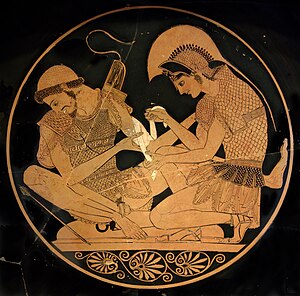Teaching the Iliad as a Living Text with Living Ideas
EDITORS NOTE: This is a re-post of a blog post originally written in 2007.
You want to start by getting students involved in THE QUESTION that drives the text or as close as you are able to do so. The Iliad puts it right on the first line: Why is Achilles so angry? I convert the question to a judicial issue: Should Achilles have been so angry?
Before starting the Iliad, prepare your students for the theme by asking them about the last time they’ve seen a fight, the last fight they had, whether they’ve ever been dishonored, why they get angry, etc. etc. I find that the very act of asking this question and genuinely listening leads students to open up quite surprisingly (but never force a child into a therapy session in the classroom!).
You could also ask them what they already know about the story, especially the first book (this is where background sticks up its head – but you are asking them what they already know, not telling them something they may or may not care about). Ask them if they have ever heard of the Greek gods, which they know, whether they’ve heard of the Trojan war, why it was fought, etc. etc.
Then ask them to read the first book. When they come to the next discussion, ask: Who should get Briseis? Or, Is Achilles over-reacting? Or, Is Agamemnon over-reacting? Then let them have at it. They should have their books in front of them. If one person says yes and another says no, the class has just come alive.
In this context, you can begin to intoduce plot lines, character development, use of imagery and symbols, key words, even settings.
For example, say one student has argued that Achilles is in the right. Another contents that point. You are the referee! Say to them, “OK, let’s examine this together.” Be very, very respectful and don’t let either of them attack the other or lose face. And don’t ask them to side with you. That would be fatal. Also, don’t ask them to do more than they are able to do. They’re new to this.
Instead, ask a question like this: “Where did this argument take place?” Some will say, in the camp, before Troy, in front of the men, etc. etc. Let the whole class participate. Then, after the discussion has dug out a bunch of information, say, “Given where the argument occurred, does that argue for or against Achilles?” Then let them have at it again.
You could also ask, straightforwardly and repeatedly, “Why is Achilles so angry?” Another way to phrase that would be, “What did Agamemnon take from him? Why does that matter so much?” And bingo, now you can talk about kleos, and time, and athanatos (glory, honor, and immortality) – though I’d suggest doing it one at a time and reminding them that this is all about them. “Which of you would like to receive glory?” Or “Which of you likes to be humiliated?” Better would be, “Have any of you ever had this happen to you?” I’ve even asked, “Have I ever done this to any of you?”
Do you see how they are BOTH taking a close look at the text AND relating it to their own situations and experiences and that they are able to do so with no loss to either? This is THE WHOLE POINT OF LITERATURE!!!!!
And do you see how the word Kleos is not given to them in an abstract, empty form, but as something they now are beginning to realize is the very core of the soul of the heart of their spirits? In other words, kleos isn’t background to the Iliad, it’s the idea that drives it!












